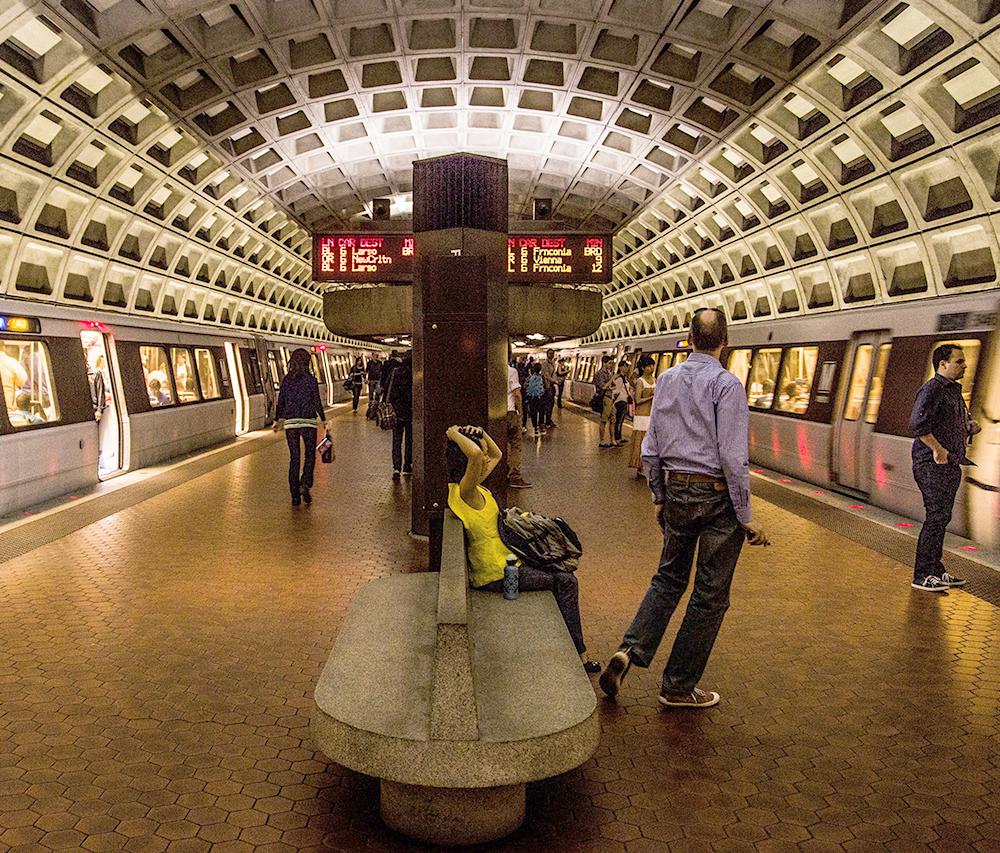 Seventy-seven percent of riders sexually harassed on the Metrorail do not report the incident, according to an inaugural survey measuring awareness and reporting of sexual harassment on the Metro released by the Washington Metro Transit Police on April 12.
Seventy-seven percent of riders sexually harassed on the Metrorail do not report the incident, according to an inaugural survey measuring awareness and reporting of sexual harassment on the Metro released by the Washington Metro Transit Police on April 12.
With data collected from 1,000 respondents over the course of the month of January, the survey reported that 21 percent of riders have experienced a form of sexual harassment, ranging from sexual assault to verbal harassment, in the Washington, D.C. area, higher than the national rate of 18 percent.
The study also found that women were three times more likely to face harassment, with 28 percent of female respondents reporting incidents compared to 9 percent of men who reportedly experienced harassment.
Released in light of Sexual Assault Awareness Month and International Anti-Street Harassment Week from April 10 to 16, the survey was part of a yearlong collaborative effort between WMTP and advocacy organizations Collective Action for Safe Spaces and Stop Street Harassment to combat sexual harassment on the Metro.
Additional efforts include public outreach through an advertisement campaign, a $40,000 grant by the D.C. Commission on the Arts and Humanities dedicated to public art addressing the issue and more advanced methods of reporting incidents to Washington Metro Transit Police, including a website, an email address and text messaging system.
The survey found that 75 percent of sexual harassment was labeled as “verbal harassment,” while 47 percent was characterized as “leering.” Two percent of reported incidents were sexual assault whereas 9 percent were groping incidents.
SSH Founder and Executive Director Holly Kearl said the purpose of the survey was to provide her organization with a baseline for how best to proceed with anti-harassment efforts.
In a press release, Lynn Bowersox, assistant general manager of customer service, communications and marketing of the Washington Metropolitan Area Transit Authority, said the purpose of the extended efforts to combat sexual harassment is to ensure the welfare of riders.
“Metro is working to make all riders feel safer and more comfortable on the system, and raising awareness about sexual harassment is an important part of that effort,” Bowersox wrote.
Kearl also praised WMATA for taking steps to combat sexual harassment by conducting the survey.
“The fact that they did this survey at all is a huge signal that they are trying to take this issue seriously,” Kearl said. “No other transit system has done this level of surveying on this issue in our country.”
Kearl said she believes more incidents will be reported with the implementation of a quarterly report system.
“We’ve been trying to let our constituents know that Metro is keeping records of all the harassment,” Kearl said. “You can report something that happened a while ago, you can report something that happened today, something that you witnessed.”
Kearl added while she appreciates Metro’s efforts, its employees are still untrained to handle harassment cases and are perpetrators in some cases.
“Something that they have done before and we’re pushing them to do is to train their staff so that when someone does make a report in person that person is able to help them,” Kearl said. “Unfortunately, sometimes we do hear about Metro employees being the harasser.”
CASS Executive Director Jessica Raven said the organization is committed to spreading awareness of the issue at a grassroots level and through the Sexual Assault Education Campaign.
“In the first place we have to make sure people know it’s a problem,” Raven said. “[We should] make sure people know that police officers and staff are trained to respond to people who have experienced sexual harassment and assault.”
Raven said the Metro’s anti-harassment campaign is a step in the right direction toward combatting a culture in which citizens, especially women and the LGBTQ community, have been conditioned to accept harassment as a fact of life.
“These ads on the Metro have been significant,” Raven said. “They’re actually saying for the first time, if it’s unwanted, it’s harassment. We’re defining it, naming the problem, letting people know that this behavior is unacceptable and they don’t have to tolerate it.”
According to the survey, 41 percent of Metro riders are familiar with the education campaign. Furthermore, those familiar with the campaign are twice as likely to report sexual harassment incidents compared with the 77 percent who indicated they never reported sexual harassment incidents.
Georgetown University Student Association Policy Chair of the Safety and Sexual Assault Team Maddy Moore (SFS ’17), who is also a member of Sexual Assault Peer Educators, said she is grateful for a report detailing sexual harassment incidents on the Metro.
“It wasn’t surprising to know that people are receiving unwanted harassment and attention in public spaces,” Moore said. “I think that’s something that women especially have been subject to this for a really long time, so I’m glad there’s finally a report detailing that.”




















